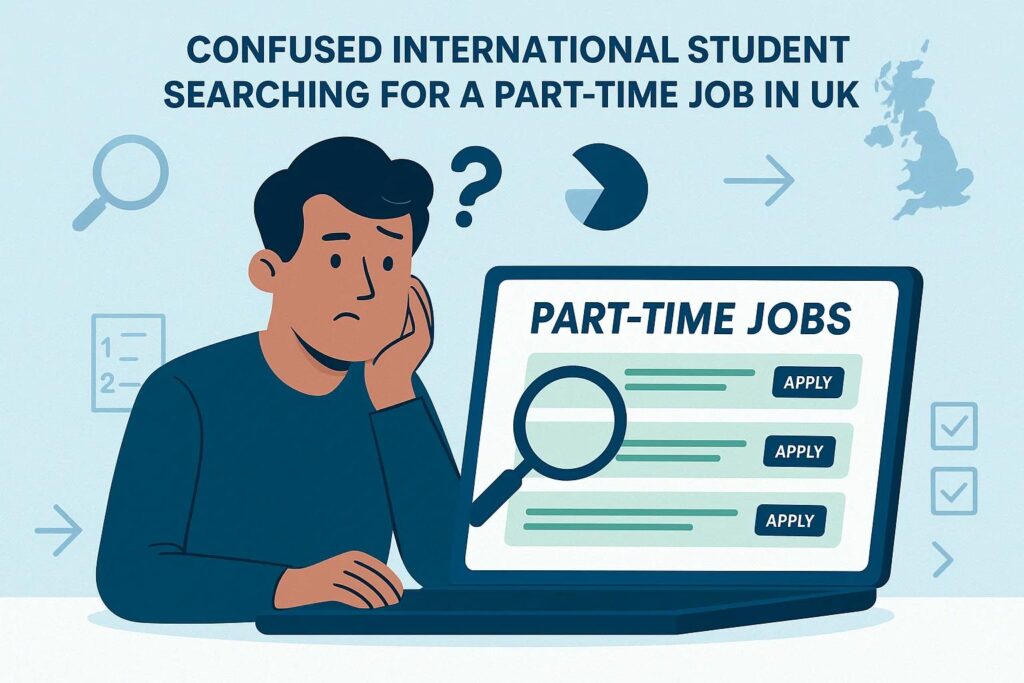Table of Contents
Introduction
Finding a job in the UK as an international student can be both exciting and overwhelming. You’re likely balancing studies, living expenses, and adapting to a new culture. The good news? With the right approach, tools, and strategies, thousands of students successfully secure part-time jobs every year in the UK.
In this complete guide on How to Find Job UK As student, you’ll uncover seven powerful methods to streamline your job hunt. Whether you’re aiming for a retail position, on-campus employment, or freelance gig, this step-by-step tutorial covers everything from legal requirements to expert-level search techniques.
By the end of this article, you’ll be equipped to:
- Identify job types available for students
- Use top job portals and networking strategies
- Create tailored CVs and standout applications
- Avoid common mistakes and boost your chances
Estimated time investment: 3–5 hours
Difficulty level: Beginner to Intermediate

Prerequisites/Requirements
Before diving into the job hunt, students need to meet several requirements:
- Student Visa Compliance: You must be on a valid Tier 4/Student Visa, which allows limited working hours (typically 20 hours/week during term).
- National Insurance (NI) Number: Required for employment in the UK.
- Bank Account & UK Address: Many employers require these details for payment.
- Basic CV & Cover Letter: Tailored for part-time roles.
- Time Commitment: 3-5 hours per week for job applications and interviews.
- Skill Level: Beginner-friendly roles available, though prior customer service or communication skills help.
Budget-wise, most resources are free unless you opt for professional CV writing or job board subscriptions.
Step-by-Step Process
Step 1: Understand UK Student Work Rules
Familiarize yourself with what your visa allows:
- Tier 4/Student Visa: 20 hours per week during term, full-time during breaks
- Restrictions: No self-employment or permanent roles
- Pro Tip: Always check your BRP card and UKVI guidelines
Avoid: Taking freelance or contract roles via Fiverr or Upwork, which may violate visa terms.
Check: UK Home Office employment conditions.
Step 2: Prepare a UK-Style CV and Cover Letter
Your CV should:
- Be 1 page long, tailored to the UK format
- Highlight soft skills (communication, teamwork, flexibility)
- Avoid unnecessary personal info (photo, DOB)
Tools: Canva (free UK CV templates), Zety CV Builder
Tip: Add UK phone number and postal code for credibility
Step 3: Register with Online Job Portals
Top job websites for How to Find Job UK As student:
- Indeed UK
- StudentJob.co.uk
- e4s.co.uk (Employment 4 Students)
- Prospects.ac.uk (for internships)
Set alerts and save job searches.
Troubleshooting: Use filters like “part-time”, “evening”, and “student jobs” for refined results.

Step 4: Visit Your University Career Centre
Most UK universities have a job portal or bulletin board:
- Ask about on-campus roles (library, student union)
- Get CV review and mock interview help
- Attend employer events and job fairs
Pro Tip: University jobs are visa-compliant and flexible with your schedule.
Step 5: Use Networking & Referrals
Leverage LinkedIn and university alumni:
- Join student groups and WhatsApp communities
- Ask professors or peers for recommendations
- Attend university career meetups
Expert Tip: 70% of jobs are filled through networking. Don’t just apply — connect.
Step 6: Apply in-Person for Local Jobs
Walk into shops, cafes, and restaurants:
- Bring printed CVs
- Dress professionally
- Ask for the manager
Best times: 10 am – 12 pm (before lunch rush)
Avoid: Peak hours or weekends when staff are busy
Step 7: Explore Gig & Freelance Platforms (Legally)
If your visa allows:
- Try TaskRabbit UK, PeoplePerHour, or Tutoring platforms
- Avoid full freelance websites unless registered as employed
Legal Check: Always consult your visa conditions before accepting freelance jobs.
Advanced Tips & Best Practices
- Tailor every CV & cover letter — don’t send the same one to 20 employers.
- Apply early in the week (Mon-Wed) — job postings receive more visibility.
- Use LinkedIn keywords like “student jobs UK” or “part-time assistant” to get alerts.
- Keep a tracker of applications, follow-up dates, and outcomes.
- Stay updated on changes in UK immigration/work rules post-Brexit.
Avoid burnout by setting daily limits on job applications and balancing your study-work routine.
Tools & Resources
Free Tools:
- Canva.com: CV design
- Indeed.co.uk: Free job portal
- LinkedIn: Networking & alerts
Paid (Optional):
- Zety CV Builder: Premium CV templates (~£2/month)
- Jobscan.co: Resume scanner to optimize your CV
Helpful Resources:

Measuring Success & Optimization
Track your progress using:
- Application-to-interview ratio
- Number of offers vs. applications
- Feedback from rejections or interviews
Use Excel or Notion to monitor your job hunt and improve continuously. If you’re not landing interviews, revise your CV or change your job search filters.
Next Steps & Advanced Techniques
Once you land your first student job:
- Look for career-boosting internships
- Build your LinkedIn with testimonials
- Join student societies and gain leadership roles
- Explore summer full-time opportunities
Eventually, use this experience to transition into a graduate visa or post-study work pathway.
Conclusion
How to Find Job UK As student have to be overwhelming. By following this step-by-step guide onHow to Find Job UK As student, you’re equipped with the tools, platforms, and strategies needed to succeed. Whether you start with campus jobs, retail gigs, or freelance tutoring, the path is clear — and you’re ready to walk it.
Now it’s your turn: Take action, build your network, and apply smart. Your UK job journey starts today!
How long does it take to How to Find Job UK As student?
Typically 2–6 weeks depending on your CV quality, job type, and location. Consistency and networking speed up the process.
What if my visa restricts work?
Always check your BRP card. If ineligible, focus on internships or volunteering. Violating terms can affect your stay.
Do I need UK experience for part-time jobs?
Not always. Entry-level jobs in retail or hospitality often hire first-time workers, especially students.
How can I find jobs near my location?
Use job filters on platforms like Indeed with your postcode. Turn on location settings and explore local boards or university centers.
Can I work remotely while studying?
Yes, but only if the job is legal and visa-compliant. Remote tutoring or virtual internships can be ideal alternatives.
Internal Link Suggestions
- Learn the basics in our International Student Visa Guide
- Explore How to Write a Winning UK CV
- Check our comprehensive Part-Time Work Tips for Students
External Links (open in new tab)
Smart students don’t just study — they work smart, too.





